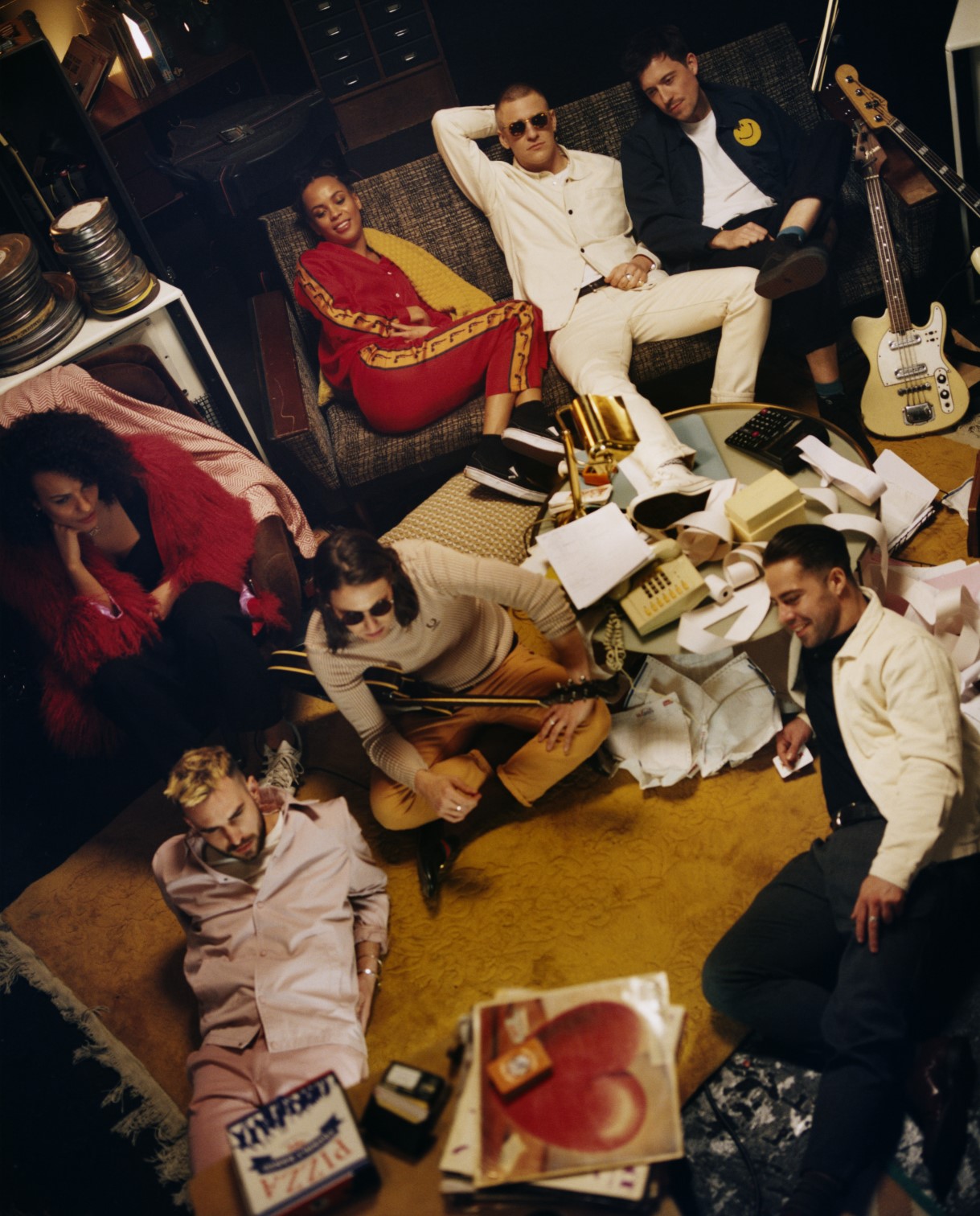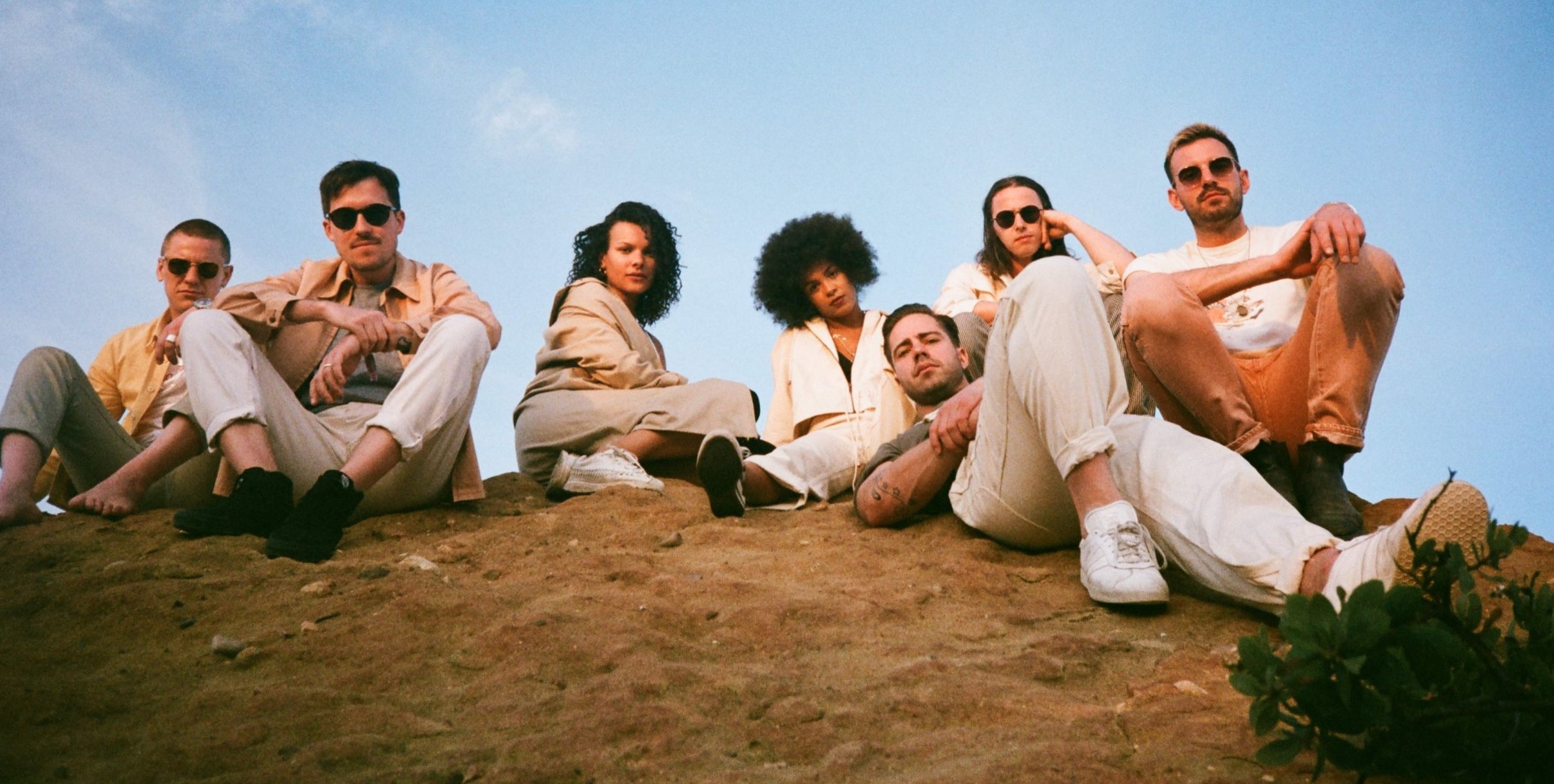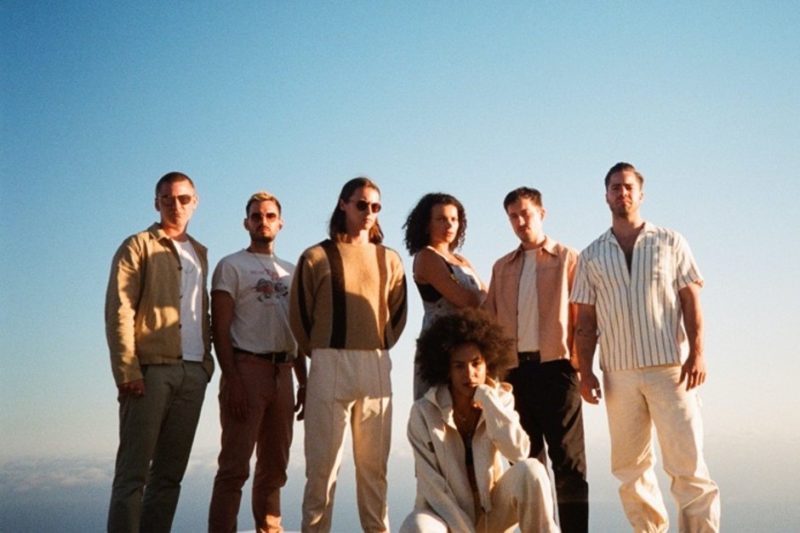Love to hate it or hate to love it: I’m talking about songwriting that seems to replicate clichés. Especially with love songs and break-up tunes, it seems that songwriters have a hard time to keep from stumbling from one cliche to the next. NBHAP already reviewed For Ever – the newest LP of Jungle in the summer – and that’s not what I’m here to talk about. But since seeing them live and interviewing them, I keep circling back to the songwriting of the album, trying to make sense of it. Since the summer, most reviews praised For Ever on the musical side, but some criticised the seemingly flat lyrics. The musicians themselves keep talking about how deep and real the experiences behind the lyrics were. How does that go together? When Jungle were on their tour in Germany, I met them to talk about realness, emotions, and their social media presence.
Here are these two men, Tom McFarland and Josh Lloyd-Watson, two Brits presumably close tor turning from the end of their twenties to thirty, representing a new kind of masculinity in their music. It’s 2018 – it’s cool to be soft as a man, to show your emotions and not to feed into stereotypical expectations of masculinity. We’ve come a long way. The vibe of their music makes me feel melancholic. Their lyrics tell me stories of being in a city, where you don’t quite belong, and of having had special expectations of a place or relationship, which were shattered all too soon. Josh Lloyd-Watson explains:.
‘Music is an expression and good music makes other people feel something. If you want to make someone else feel something you have to evoke an emotion from them, whether that is a positive emotion, negative emotion, aggressive emotion. Some emotion! If you’re not evoking any emotion, what is it really doing? It’s nothing.’
We agree and move on. To be honest, their songs made me feel so much, House in LA and Heavy, California were in my top plays on Spotify in 2018. It’s about ‘break-ups and losing people and the cycle of love,’ Josh continues to explain. ‘It’s about real-world things, real-world break-ups that we both went through. It’s about us and our journey, us becoming closer because of that, sharing experiences and emotions and effectively writing ourselves through that pain.’ Real-world break-ups. They are emphasising again and again, how they went through rich emotional experiences to write these songs. That’s fine, I believe it.
Real-world break-ups

Photo by Oliver Hadlee Pearch
Yet when you listen to the words of the tunes, they seem to skid in between what hits home and hard-core clichés constantly. It wasn’t until the concert, right after the interview, that I really realised. I’m not sure if it was the high-pitched voices creating a layered soundscape rather than words I wanted to understand, whenever I had listened to Jungle‘s songs before the gig. Or whether it was just easier to blend out the English lyrics in general, as a German native speaker. I was massively looking forward to the gig, to dance and lose myself in their music. I had heard they are brilliant live and I was proven right. The performance was amazing – if anything, it was almost too perfect. I went with a buddy, who loves the tunes of Jungle just as much as myself, or even more so. We enjoyed ourselves, we were dancing and singing along. At that moment, we both really realised the lines of the songs for the first time, such as ‘ride down Sunset Boulevard, try to find out who you are’, immediately making us laugh. They don’t honestly mean that, right? We came up with this idea that perhaps there had to be some sort of sarcasm rooted deeply in most song. But that wasn’t what the band tried to convey in the interview earlier that afternoon when they were trying to shove the realness of the incidents behind the lyrics down my throat.
‘I think it just has to be real. It has to be written about real shit. There’s a lot of soul music, quote on quote, out there, which is generic. It’s easy to fake an emotion. I think you have to actually experience the emotion. […] It’s pain, ultimately. It’s a catalyst.’ (Josh)
The challenge seems to be in turning that pain, those real and raw emotions, into something that has just as much depth. But at the same time, songs need to be relatable, so people will listen to it. Talking about common places or speaking common phrases makes things more relatable – until it turns into a cliché, which is a weird mix of vagueness and having heard something too many times before. At times, Jungle’s message feels ambiguous, too. The two musicians went through similar break-ups at the same time, in LA and London, which they based their songwriting of the new album on. When they speak about it, it sounds like they tried to merge two separate break-up experiences into one meaning. Perhaps that’s where the vagueness comes from. Is it a blessing or a curse to be in this together, from songwriting to touring the world? ‘It’s difficult at times, because there’s two people who potentially want two different things. At the same time, it’s like, if we had been on our own we would have really gone fucking mad. There’s an element of… we bring each other down. You’re doing it with somebody, you’re getting in a spaceship and you’re doing it with your best mate,’ Josh says, making Tom McFarland think of another famous duo: ‘Like Rick and Morty. Who’s Rick and who’s Morty, that’s the big question…!’

The band hasn’t appeared in most of their music videos, which feature passionate dancers instead. They don’t seem overly excited about the spotlight on them as public personas, but since the release of their first album, there has been another boom of the popularity of social media – and now they are on Instagram with their own profiles, too. Maybe their lyrics try to be ambiguous because it’s in line with the vagueness of their personas as artists? They certainly don’t agree with the controlling behaviour resulting from social media, especially the need to know everything about everyone at any time. Tom explains why that is: ‘I think a certain element of a fourth wall is important because a lot of my favourite artists, growing up as a kid, I didn’t know everything about them. I didn’t have the access I have now and it makes you more intrigued as to what they are, who they are, why they make their music, what their music is about. When everything is too cut-and-dried, it’s fucking boring. There’s no mystery. It’s like when you watch a film, do you want to know the end of the film before you watch it? No!’
Looking at how their favourite musicians shaped their public personas seems to inspire Jungle, but it’s also about analysing current musicians and figuring out who they don’t want to be like, even if management advises them against it. One thing they seem to agree on: The less you know about the actual lives of artists, the better.
‘I always feel like I’ve been in love with bands, then found out more about them and fucking hated them. I’d rather be ambiguous. Management and anybody who’s trying to sell your music will always tell you that personality is what everybody wants to see. Yeah, but if you ain’t got the personality, then why are you fucking doing it, you know what I mean? Like you either got the personality and deliver like Dua Lipa and do it all the time and that’s you,’ Josh says before adding:
‘Then you’ve got another sort of artist, like Bon Iver! I can’t remember the last time I saw his face. And it’s probably cool if you don’t turn up, because if people see into your life and find you’re actually not inspiring… There’s a lot of artists in the middle. Half-doing it.’
Maybe we don’t need to create additional emotional and insightful moment beyond the music, like on social media or even with this interview. However, why are some of us not only intrigued by the music that moves us but also the people who create it? Why does this certain fascination exist?
Despite being obliged to half-do social media, it’s still the dream to continue to be musicians for Tom and Josh, like it was when they first met when they were just kids. Even if it’s a lot less glamorous than they thought back then: ‘When we were kids, this was our dream, 100%. And that’s the only great thing about it, that we had a dream when we were kids and we are now living it. It’s probably a lot less glamorous than we imagined it to be,’ Tom says, referencing the Justice documentary about tour life, where it looks like ‘they’re having fucking orgies and pool parties every night. And you know that that’s not the reality, you know that that only happens once in a blue fucking moon, if ever. This never happened, I’ve never been in a jacuzzi after a show. Just one jacuzzi, that was at my cousin’s farm, and there were a lot of 50-year-olds there. Yeah, but we wouldn’t change this for the world.’
And I’m glad because I want Jungle to make more music. Their music makes people feel something. They are brilliant live. I can’t wait for a third album and more gripping melodies. I want to see them grow as songwriters. I do believe that there is honesty in the words of their songs. I accept that they also like to be ambiguous and that cliched phrases sometimes makes sense to describe reality. It’s a meaning others have laid out before us, perhaps these phrases at the melting point of familiarity and vagueness are best to communicate the pain of something universal like a break-up. That is what make us understand real things in a simple way. Realness and clichés are wholly intertwined in music. And I guess I’m okay with that.



